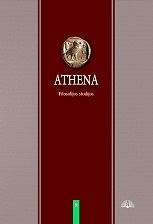Judantis amžinybės atvaizdas: laikas ir jo veidai Platono filosofijoje
Moving Image of Eternity: Time and Its Faces in Plato’s Philosophy
Author(s): Naglis KardelisSubject(s): Philosophy
Published by: Lietuvos kultūros tyrimų
Keywords: Plato; time; eternity; image; ancient Greek philosophy; ancient Greek literature; history of philosophy; contemporary philosophy; phenomenology; hermeneutics
Summary/Abstract: The author of the article focuses on the various aspects of time in Plato’s philosophy, discussing the explicit theoretical understanding of time in late Platonic dialogues (especially the Timaeus) as well as those manifestations of time which might be discerned at various levels of Plato’s texts: at the level of their philosophical content, at the level of narrative form of the dialogues where a certain recurrent narrative sequence forms a specific temporal framework characteristic of Plato’s way of narration, and at the level of the very history of the development of Plato’s philosophical views as well as the hypothetically reconstructed history of the formation of Platonic textual corpus which enables us to construct a hypothetical temporal sequence of relative dates attached to Platonic dialogues. Firstly, the author analyses the explicit theoretical understanding of time extant in the late Platonic dialogue Timaeus, mainly focusing on some philosophical implications of the notion of time as the moving image of eternity. A philosophical paradox inherent in Plato’s understanding of time as some sort of „reduced“ eternity ir brought to the fore. After that, the author of the article discusses a series of textual examples which might be treated – perhaps somewhat anachronistically – as instances of literary and philosophical approach which could be interpreted as indirect signs of the emerging phenomenology of time (or, at least, some sort of protophenomenology of time) in Plato’s dialogues. The way Plato links the description of the „objective“ flow of time with the description of how an embodied creature, say Socrates, subjectively feels the flow of time, as well as other similar textual examples, might be presented as clear instances of such emerging protophenomenology of time. The temporal framework of Platonic dialogues which might be discerned in and analysed from the standpoint of some specific features of Platonic narrative presents yet another context and possibility of interpretation of Platonic textual corpus in terms of time. The various levels of dramatic intensity characteristic of different parts of a dialogue can be linked with the varying pace of the flow of dramatic time in the narrative sequence of each dialogue. The fourth aspect of time in Platonic dialogues might be linked with the history of the development of Plato’s philosophical views and the formation of the textual corpus of Platonic dialogues. In this respect, two alternative possibilities should be brought to the fore: the first possibility is that of slight, moderate, or even radical change of Plato’s philosophical views over time, and the second one is that of relatively unchanging or even firmly fixed philosophical views of Plato which were undergoing change over time not in terms of essential philosophical substance, but only in terms of the presentation of some fixed system of philosophical views...
Journal: Athena: filosofijos studijos
- Issue Year: 2012
- Issue No: 8
- Page Range: 11-36
- Page Count: 26
- Language: Lithuanian

